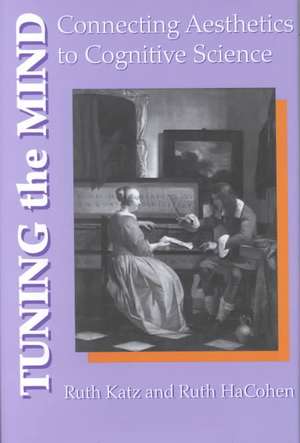Tuning the Mind: Connecting Aesthetics to Cognitive Science
Autor Ruth HaCohenen Limba Engleză Hardback – 31 mar 2002
As the authors note, the differences between the physical and emotional dimensions of music stimulated novel conceptions and empirical inquiries into the old aesthetic queries. Tracing this development, their opening chapter deals with seventeenth-century epistemological issues concerning the artistic qualities of music. Katz and HaCohen show that painting and literature displayed a comparable tendency toward "musicalization," whereby the dynamic of forms-the modalities specific to each artistic medium-rather than subject matter was believed to determine expression. Katz and HaCohen explore the ambiguities inherent in idealization of an art form whose mimetic function has always been problematic. They discuss the major outlines of this development, from Descartes to Vico through Condillac. Particular emphasis is placed on eighteenth-century British thinkers, from Shaftesbury to Adam Smith, who perceived these problems in their full complexity. They also explore how the French and the Germans dealt differently with questions that preoccupied the British, each nation in accordance with their own past tradition and tendencies. The concluding chapter summarizes the parallel development of abstract art and basic hypotheses concerning the mind and explores basic theoretical questions pertaining to the relationship between perception and cognition.
In addressing some of the most complex problems in musical aesthetics, Katz and HaCohen provide a unique historical perspective on the ways their art creates and develops coherent worlds, and, in so doing, contribute to our understanding of the workings of the mind.
Preț: 769.90 lei
Preț vechi: 1030.77 lei
-25% Nou
Puncte Express: 1155
Preț estimativ în valută:
147.31€ • 153.83$ • 121.65£
147.31€ • 153.83$ • 121.65£
Carte tipărită la comandă
Livrare economică 15-29 aprilie
Preluare comenzi: 021 569.72.76
Specificații
ISBN-13: 9780765800817
ISBN-10: 0765800810
Pagini: 332
Dimensiuni: 152 x 229 x 30 mm
Greutate: 0.77 kg
Ediția:New.
Editura: Taylor & Francis
Colecția Routledge
Locul publicării:Oxford, United Kingdom
ISBN-10: 0765800810
Pagini: 332
Dimensiuni: 152 x 229 x 30 mm
Greutate: 0.77 kg
Ediția:New.
Editura: Taylor & Francis
Colecția Routledge
Locul publicării:Oxford, United Kingdom
Cuprins
1: Moving the Passions of the Mind: The Ascendance of a Query; 2: From Harmony of the Spheres to Music’s Atmosphere: Trends in Seventeenth- and Eighteenth-Century Art; 3: Music’s Begotten Illusion; 4: Signs as Cognitive Tools; 5: Sense, Sensibility and Commonsense— The British Paradigm; 6: The French and German Scene; 7: Postscript: Sense and Meaning Interlocked
Descriere
Starting from the late Renaissance, efforts to make vocal music more expressive heightened the power of words, which, in turn, gave birth to the modern semantics of musical expression













